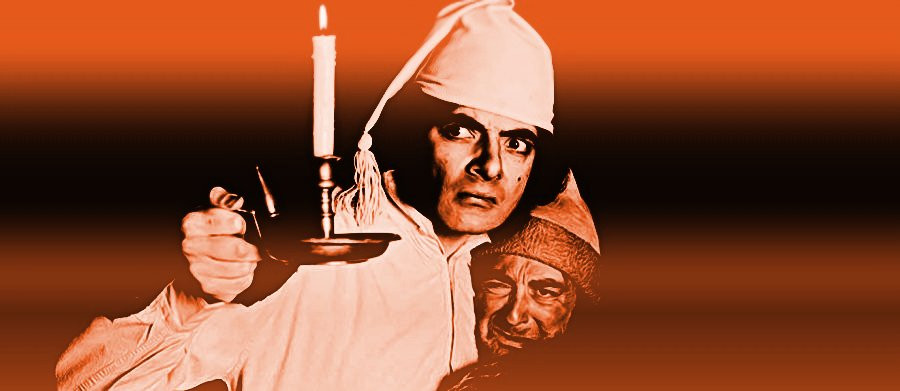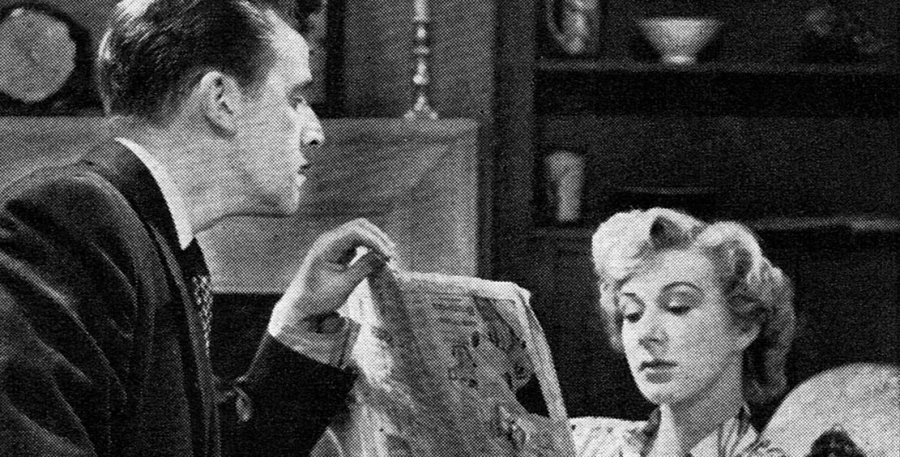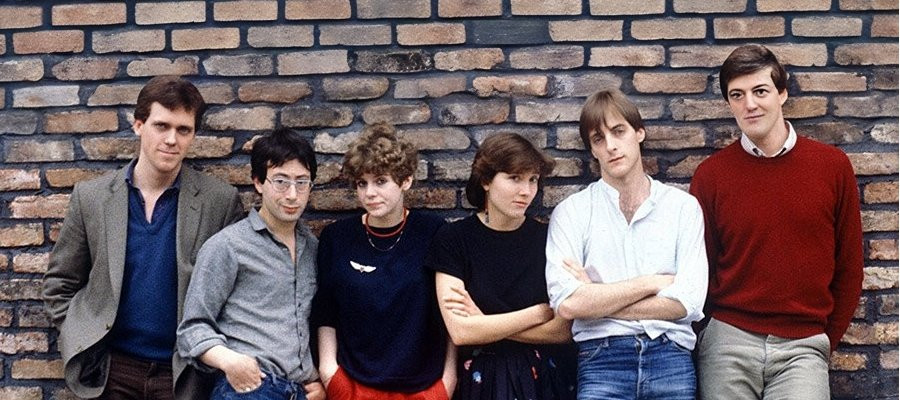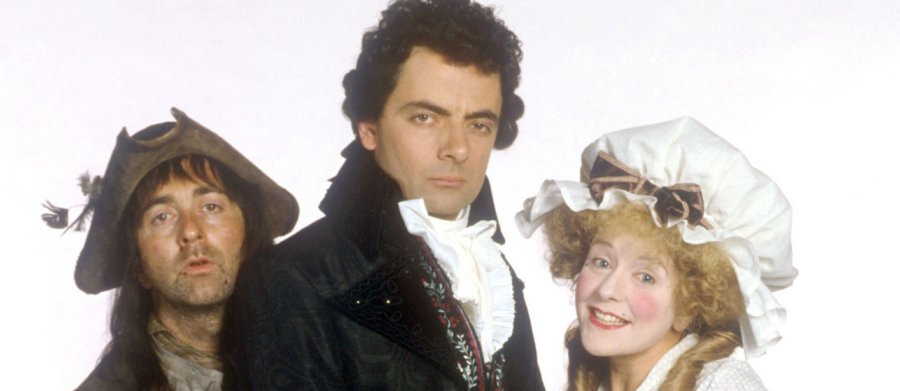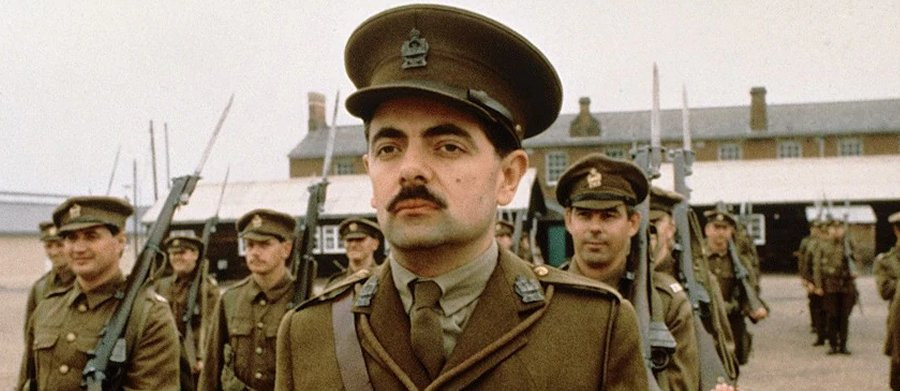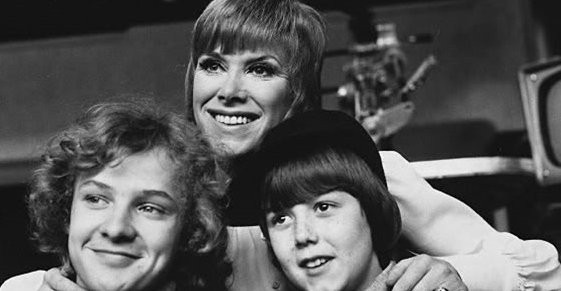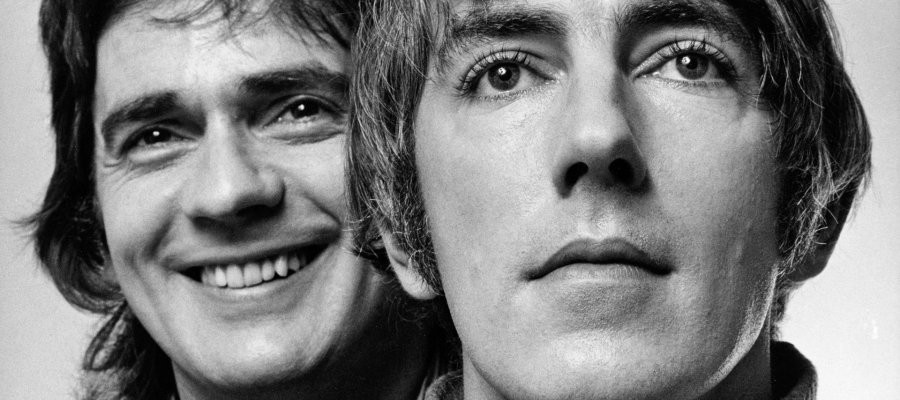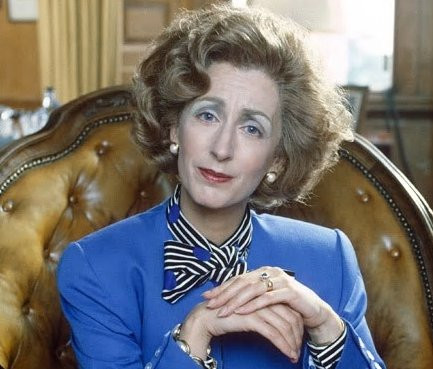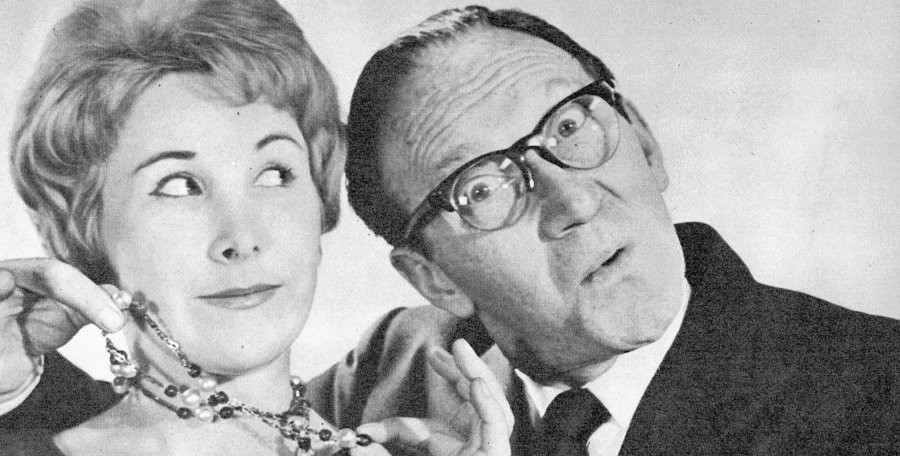
The Black Adder - Series 1
The Pilot Episode and the First Series
by Daniel Tessier
“Black, his gloves of finest mole!
Black, his codpiece made of metal!
His horse is blacker than a vole!
His pot is blacker than his kettle!”
The Blackadder saga is rightly regarded as one of the great British sitcoms, as well as one of the most unique. From 1983 to 1989, four series were produced and broadcast by the BBC, spanning over five hundred years of history, with a number of specials and sketches keeping the characters alive even beyond that. Each series, set in a different historical period, saw the central characters reiterated along their family line, allowing many actors to return time and again either as regulars or special guests – although only two, Rowan Atkinson's Blackadder and Tony Robinson's Baldrick, would appear in every broadcast episode.
The first series, titled The Black Adder , is a strange one though, and has never reached the same kind of popularity as its successors. While the second, third and fourth series were written by Richard Curtis and Ben Elton, The Black Adder was co-written by Curtis and the series' star Rowan Atkinson, who conceived of the idea while working on Not the Nine O'Clock News . It's quite unlike the later series, with a different take on Blackadder and Baldrick. Blackadder is best remembered as a cunning, duplicitous man blessed with intelligence, charm and sophistication, while Baldrick is a stinking idiot. In The Black Adder , however, their roles are reversed. Prince Edmund – the Black Adder – while just as ambitious and duplicitous, is a slimy, vindictive fool. It's Baldrick, his underling, who's the clever one, who can justifiably claim to have many a cunning plan.
Given the differences in its core characters, The Black Adder looks like an early draft of the series, before the writers had hit on the right combination. Surprisingly, though, it's not the earliest version of the concept. Curtis and Atkinson's first script for The Black Adder was filmed in 1982 as a pilot episode, intended to sell the property as a series. Although it's never been broadcast or released on home video (primarily due to the poor quality of the surviving footage) bootleg copies have been circulated for years, and it's possible to find it online these days (albeit not strictly legally). Plus, it was filmed in front of a live audience, which means there are at least a few people still around who saw it performed.
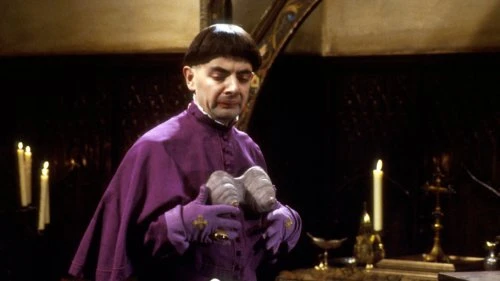
Stuart Heritage wrote in The Guardian in 2010 that the pilot episode is “an interesting example of getting it right first time,” and he's dead right. The pilot episode settles on much of the formula that made the second series Blackadder II such a success. Seemingly set during the Elizabethan era, it sees Prince Edmund as the cool and conniving Blackadder we know, while Baldrick is his stupid servant. However, in a jarring difference to the broadcast series, Baldrick is played by Philip Fox ( People Like Us, Waking the Dead). The character is today irrevocably linked to Tony Robinson, so to see him played by anyone else is bizarre. While the character is closer to the Baldrick we know from the more popular series, Fox makes for a pale comparison to Robinson. Tim McInnerny ( 101 Dalmations, Notting Hill, Edge of Darkness) is present as Edmund's obsequious underling Lord Percy, who would appear as the second idiot on the staff in both the first and second series. The tone of the episode is closer to that of Blackadder II , with the humour and the story very much on Blackadder's side.

The pilot episode begins with a rolling caption stating that it's set four hundred years ago (so some time in the late 16th century) when England is at war with Spain, and Elspet Grey (Catweazle, Solo) plays a nameless queen who is styled very much like Elizabeth I. Otherwise, though, it's clearly not the court of Queen Elizabeth. She's married for a start, to a king played by John Savident (Coronation Street , A Clockwork Orange), with two sons: Prince Henry, played by Robert Bathurst (Red Dwarf, Joking Apart, Cold Feet), and Prince Edmund. So much for the Virgin Queen! And that's before we learn of her indiscretion with the Duke of Argyll...
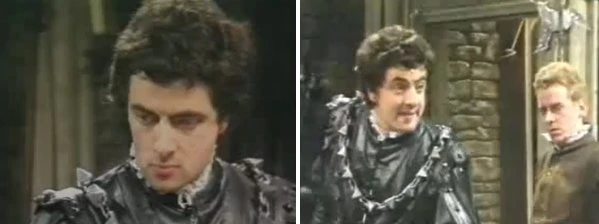
The episode was well-received enough to get the series greenlit, but major changes were made as the series was written. The pilot episode (titled only “The Black Adder”) was reworked to become the second episode of the series (albeit broadcast fourth on later showings) and comparing the two versions is fascinating. However, the setting was entirely changed. No longer a pseudo-Elizabethan setting, The Black Adder was now to be an alternative history of the 15th century. In this alleged history, King Richard III (the great Peter Cook of Not Only...But Also… and Beyond the Fringe) won the Battle of Bosworth Field that concluded the Wars of the Roses, although he is carelessly murdered by his grandson Edmund. He is then succeeded by his son, King Richard IV (the mighty Brian Blessed, no introduction needed) even though the historic Richard was only twelve at this time, if he was even still alive.
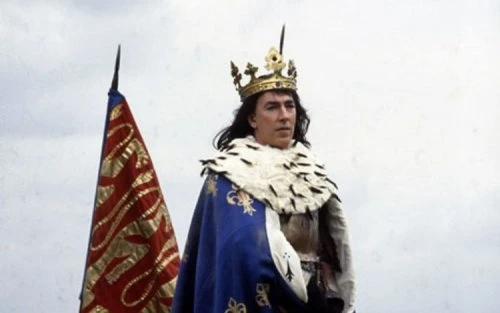
The series then follows Prince Edmund, Duke of Edinburgh, Warden of the Royal Privy, scheming to push his father and elder brother (Harry, Prince of Wales, now played by Robert East, best known for Dave Allen at Large) off the throne and line of succession and to ascend to the throne himself. Elspet Grey returns as the Queen – now Gertrude of Flanders. Edmund sets his own destiny as the Black Adder (actually Baldrick's idea – Edmund preferred the Black Vegetable) thereby founding the dynasty that we'll follow through history. While Percy is a minor noble, he's little more than a sidekick and the brunt of most of Edmund's rage and mockery, as he channels his own humiliation in court. Baldrick, son of Roger the Dung Gatherer, is clearly the cleverest character in the series, in spite of his lowly status and poor treatment by Edmund. While Edmund is the main protagonist, he's far from a hero, and we're encouraged to laugh at his continual misfortunes. Even as we enjoy his various plots to better himself, we're left in no doubt that he's going to fail, often terribly embarrassingly.
Many of the stars were starting out on their careers, with the close friendships (and rivalries) of much of the alternative comedy circuit bringing in talent for guest parts. Jim Broadbent (then known mainly for Not the Nine O'Clock News and Only Fools and Horses , now a major film star), Rik Mayall (then already a smash hit due to The Young Ones)and Bill Wallis ( Not Only...But Also… , Dangerfield) all made appearances in the first series, going on to play further guest roles in future Blackadder series. Now noted British actors involved including Alex Norton (Taggart, Two Doors Down, Braveheart) returning in episode two, “Born to Be King,” to the role of MacAngus from the pilot. Miriam Margolyes (Monkey, The Age of Innocence, James and the Giant Peach) gave a hilarious performance as the Spanish Infanta in episode three “The Queen of Spain's Beard.” Margolyes also returned in new roles in later Blackadder productions. Most episodes also featured major stars and sought after actors in special guest roles. In addition to the ones already mentioned, William Russell ( Doctor Who , The Adventures of Sir Lancelot , here credited as Russell Enoch), Valentine Dyall (“The Man in Black” on Appointment with Fear ) and Frank Finlay (Casanova, Bouquet of Barbed Wire , Laurence Olivier's Othello) all made guest appearances during the series.
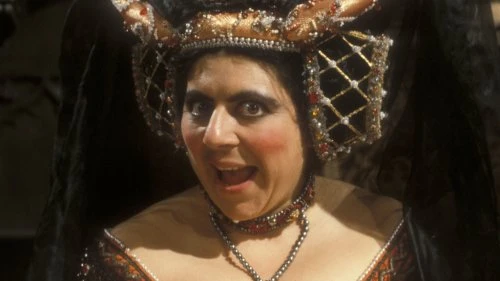
Each episode, tracking events in Richard's reign from its beginning in 1485 to its end in 1498, parodies a different element of mediaeval life or storytelling, with the opening episode “The Foretelling” pastiching Shakespeare's plays Richard III and MacBeth, and later episodes covering everything from politically-arranged marriages to witch trials. An introductory voiceover by Patrick Allen (also appearing as the Hawk in the final episode “The Black Seal” and known for Crane, The Baron, The Champions and many, many voiceovers) sets out the premise of the episode. Each episode boasts “additional dialogue by William Shakespeare” and is “filmed in glorious Television!” The series' opening theme is a stirring orchestral piece, written by Howard Goodall (who would later compose the themes for Red Dwarf, Mr Bean and The Vicar of Dibley among others). Over the closing credits ran a hilarious song with mock-heroic lyrics sung by the King's Singers' baritone Simon Carrington: “Black Adder, Black Adder, he rides a pitch black steed! Black Adder, Black Adder, he's very bad indeed!” The unmistakeable title music and song would be reworked for the following series to better reflect each historical setting. Meanwhile, the incidental music was provided by pipe organ, a very unusual choice for a sitcom.
It's a huge and sprawling production; unlike the studio-bound pilot episode, the series involved considerable location filming, primarily at and around Alnwick Castle and Brinkburn Priory in Northumberland. With a huge cast of extras and elaborate costumes and sets, the series is rumoured to have cost a million pounds, a phenomenal amount of money for a sitcom in the eighties. It's fair to say the BBC probably underestimated what they had committed to when they greenlit the series.
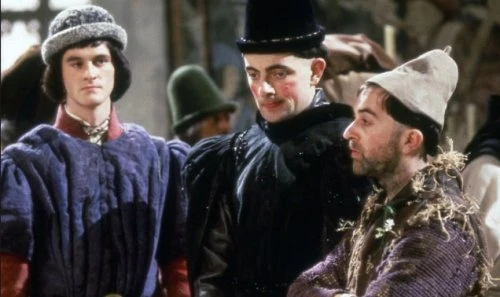
While it's a remarkable production, The Black Adder doesn't always work as a comedy, with considerable time spent on fight scenes and sweeping shots that look wonderful but slow down the pace of the humour. However, while it doesn't stand up to its successors in terms of comedic quality, The Black Adder has a lot to recommend it and is much better than its reputation suggests. The third and fourth episodes, “The Archbishop” and “The Queen of Spain's Beard” are absolutely brilliant, and all the episodes have a great deal to recommend them. Perhaps the weakest is the fifth episode, “Witchsmeller Pursuivant” and even this is a solid parody of black magic horror films such as Witchfinder General . On the occasions that an episode starts to drag, you can rest assured that Brian Blessed will be along shortly to bellow things back into action (“Chiswick! Fresh horses!”).
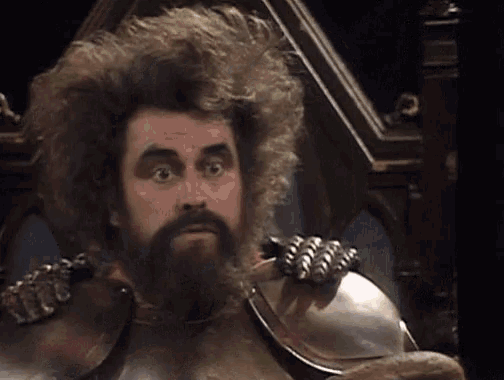
Some of the humour is rather dated now; there are several jokes that might be seen as homophobic or misogynistic by modern sensibilities, but for 1983 they were very mild. There's also a long seam to the series of laughing at foreigners, something that continues throughout the Blackadder saga and also something for which the British rarely need encouragement (especially when it comes to the French).
The best things about the series, without a doubt, are Atkinson and Robinson as Edmund and Baldrick. While their characters aren't the versions most fondly remembered by audiences, they are still sublimely performed, with Atkinson in particular standing out, using his marvellously rubbery face for maximum effect. It's surprising that the series on which he had the most influence would also be the one where he played a snivelling, grovelling character, subject to constant humiliation. Atkinson might have been the star of the series, but he had to put up with an unflattering bowl haircut and a succession of ridiculous codpieces. While Prince Edmund isn't the Blackadder we learned to love, his character does develop over time to someone more cunning, more dangerous and closer to the Blackadder we'd follow throughout history.
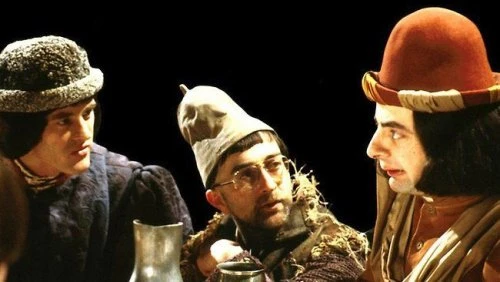
Perhaps the chief failing was in choosing the Middle Ages as the series' setting. While the public has a broad strokes knowledge of the era, and while the writers weren't afraid to be inaccurate or even wildly anachronistic, hanging each episode on specific elements of mediaeval history wasn't the best way to appeal to the public. An evil Friar Tuck analogue is easy to get, but lines alluding to the assassination of Thomas Beckett or lines from Henry V might be asking too much of the average viewer. This limited appeal, alongside the inconsistent humour and set against the enormous expense of the series, almost led to its cancellation. BBC1 controller Michael Grade only authorised a second series if a major reworking took place, involving considerable cost-cutting. This was probably the best thing that could have happened. Unable to rely on striking visuals or swashbuckling stories, the writers had to focus on the comedy. Pushed back in the direction of the pilot episode, Blackadder II would prove to be the making of Blackadder.

Daniel Tessier
Dan describes himself as a geek. Skinny white guy. Older than he looks. Younger than he feels. Reads, watches, plays and writes. Has been compared to the third, fourth, fifth, sixth, seventh, eighth, tenth, eleventh and twelfth Doctors, and the Dream Lord. Plus Dr. Smith from 'Lost in Space.' He has also had a short story published in Master Pieces: Misadventures in Space and Time a charity anthology about the renegade Time Lord.
Dan's web page can be here: Immaterial
Published on August 3rd, 2020. Written by Daniel Tessier for Television Heaven.


